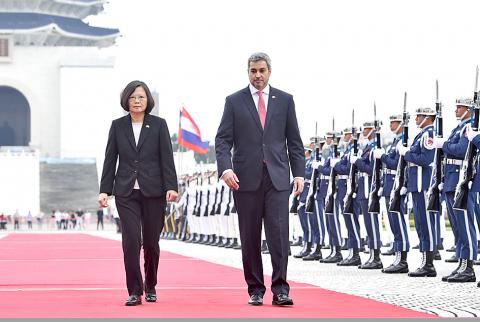Taiwan and Paraguay have signed a five-year memorandum of understanding (MOU) worth US$150 million, the Ministry of Foreign Affairs announced yesterday.
After months of negotiations, the MOU was signed in the South American diplomatic ally’s capital, Asuncion, on Dec. 14, ministry spokesman Andrew Lee (李憲章) said.
Lee said the deal focuses on projects related to humanitarian and social aid, education, housing and infrastructure that can meet the Paraguayan government’s expectations and benefit its people.

Photo: Peter Lo, Taipei Times
“Taiwanese and Paraguayan firms will enjoy priority when bidding on contracts for the projects, which have to use products from Taiwanese brands, creating a win-win situation,” Lee said.
The two nations’ intent to sign the MOU was unveiled by Paraguayan President Mario Abdo Benitez, who after a state visit to Taiwan in October last year said on Twitter that Taiwan had agreed to invest US$150 million in his nation to boost economic, infrastructure and education development.
Taiwan was the first nation Abdo Benitez visited after he was inaugurated in August last year at a ceremony attended by President Tsai Ing-wen (蔡英文), Lee said, adding that at the UN General Assembly in New York in September last year Paraguay spoke out for Taiwan’s bid to join the body.
After taking office, Abdo Benitez expressed the hope that in addition to an existing project to build 4,500 homes in 39 communities in 16 Paraguayan provinces, Taiwan could also assist with the promotion of education, social welfare and medical services, Lee said.
Taiwan and Paraguay in August last year jointly established the Taiwan-Paraguay Polytechnic University (Universidad Politecnica Taiwan-Paraguay) in the South American nation, with funds for construction provided by Asuncion, while teachers, curriculums and lab equipment are to be provided by the National Taiwan University of Science and Technology.

Taiwan is gearing up to celebrate the New Year at events across the country, headlined by the annual countdown and Taipei 101 fireworks display at midnight. Many of the events are to be livesteamed online. See below for lineups and links: Taipei Taipei’s New Year’s Party 2026 is to begin at 7pm and run until 1am, with the theme “Sailing to the Future.” South Korean girl group KARA is headlining the concert at Taipei City Hall Plaza, with additional performances by Amber An (安心亞), Nick Chou (周湯豪), hip-hop trio Nine One One (玖壹壹), Bii (畢書盡), girl group Genblue (幻藍小熊) and more. The festivities are to

Auckland rang in 2026 with a downtown fireworks display launched from New Zealand’s tallest structure, Sky Tower, making it the first major city to greet the new year at a celebration dampened by rain, while crowds in Taipei braved the elements to watch Taipei 101’s display. South Pacific countries are the first to bid farewell to 2025. Clocks struck midnight in Auckland, with a population of 1.7 million, 18 hours before the famous ball was to drop in New York’s Times Square. The five-minute display involved 3,500 fireworks launched from the 240m Sky Tower. Smaller community events were canceled across New Zealand’s

The Ministry of Foreign Affairs (MOFA) yesterday said it is closely monitoring developments in Venezuela, and would continue to cooperate with democratic allies and work together for regional and global security, stability, and prosperity. The remarks came after the US on Saturday launched a series of airstrikes in Venezuela and kidnapped Venezuelan President Nicolas Maduro, who was later flown to New York along with his wife. The pair face US charges related to drug trafficking and alleged cooperation with gangs designated as terrorist organizations. Maduro has denied the allegations. The ministry said that it is closely monitoring the political and economic situation

‘SLICING METHOD’: In the event of a blockade, the China Coast Guard would intercept Taiwanese ships while its navy would seek to deter foreign intervention China’s military drills around Taiwan this week signaled potential strategies to cut the nation off from energy supplies and foreign military assistance, a US think tank report said. The Chinese People’s Liberation Army (PLA) conducted what it called “Justice Mission 2025” exercises from Monday to Tuesday in five maritime zones and airspace around Taiwan, calling them a warning to “Taiwanese independence” forces. In a report released on Wednesday, the Institute for the Study of War said the exercises effectively simulated blocking shipping routes to major port cities, including Kaohsiung, Keelung and Hualien. Taiwan would be highly vulnerable under such a blockade, because it